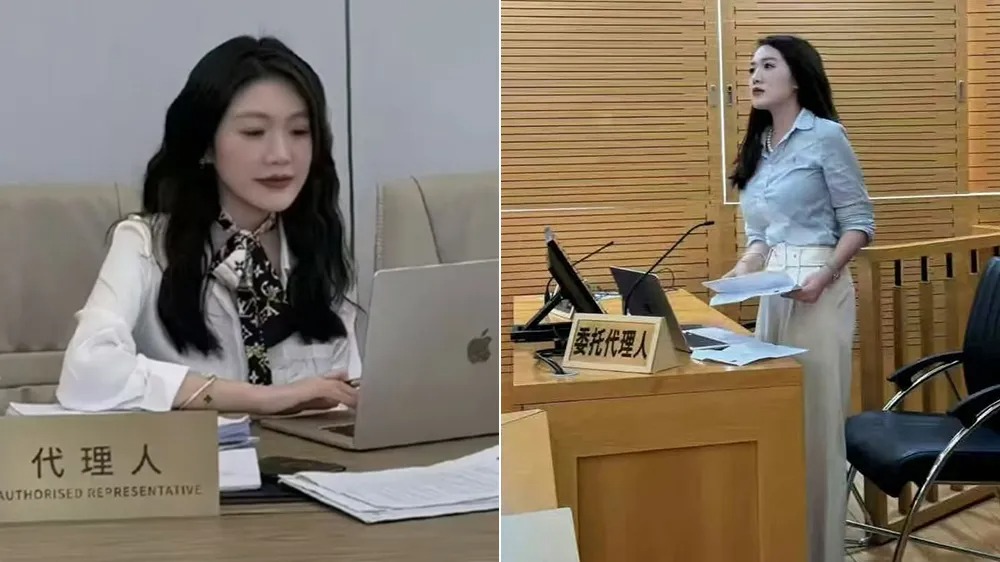Police in Chengdu's Tianfu New Area launched a criminal investigation on July 10 into Zhao, known online as "Lawyer Xilu," on suspicion of fraud. She was arrested on July 4.
Zhao cultivated a glamorous persona on her social media accounts, showcasing designer bags, stylish attire, and a seemingly affluent lifestyle. "She exuded an aura of success, from head to toe. Just one look and you knew she was well-off," said a follower of six months.
With tags like "female lawyer" and "women's power," her posts depicted a busy professional life: court appearances, client meetings, case discussions, interviews with prospective lawyers, and daily work meetings. She boasted of being a legal advisor to a celebrity and having received second and third-class commendations from a government agency.
 |
Zhao cultivated a polished and glamorous image online. Photo: Weibo |
Zhao cultivated a polished and glamorous image online. Photo: Weibo
Following the incident, Zhao's Xilu account was quickly scrubbed and flagged as a "risk account" by the platform.
A divorce case unravels the deception
Zhao's charade unraveled during a divorce case. She is accused of defrauding a client of 4.4 million CNY (over 650,000 USD) and has yet to fully repay the sum. At the time, Zhao was a senior partner at Chengdu Dehe Hantong Law Firm, having worked there for over six months.
Zhao privately contacted the client under the guise of "asset separation," urging them to transfer assets to her personal account. Exploiting the client's anxieties about potential asset freezes during litigation, Zhao convinced them that transferring the funds would not only prevent this but also circumvent future asset division. The client signed an asset ownership authorization agreement bearing the firm's official seal and transferred over 4 million CNY to Zhao's account.
Contrary to expectations, the divorce was settled quickly through mediation. Zhao's justification for holding the client's assets vanished. On June 14, after repeated delays and excuses, the client reported Zhao to the police. The client’s lawyer confirmed that Zhao has only returned around 1 million CNY.
Investigations revealed that Zhao used the funds for luxury purchases and extravagant spending with her boyfriend, a lawyer surnamed Zhang. They were caught off guard by the swift settlement and couldn't repay the money. Colleagues then discovered that much of Zhao's apparent wealth – designer goods and luxury cars – was either fake or rented.
 |
Zhao shared details of her life and work on social media. Photo: Weibo |
Zhao shared details of her life and work on social media. Photo: Weibo
The law firm discovered Zhao had forged the contract seal and was impersonating a lawyer. The firm's head accompanied her to the police station to confess.
On June 15, Dehe Hantong Law Firm publicly announced that Zhao was not a licensed lawyer and had never passed the bar exam.
Lax oversight at the law firm?
By fabricating legal content, Zhao and her boyfriend presented themselves as a "lawyer power couple," cultivating an image of sophistication and expertise online. The law firm claims they were deceived by Zhao's fabricated credentials. Impressed by her online presence and self-proclaimed accomplishments, they believed her to be a valuable asset. The firm admits to not thoroughly verifying Zhao's qualifications.
While Zhang completed the onboarding process after their partnership agreement, Zhao continually delayed submitting her paperwork. The firm only vetted Zhang's documents, and Zhao, linked to him, slipped through the net. When questioned, the firm attributed its failure to detect the deception to "inadequate vetting during recruitment" and "management oversight."
An industry insider suggested Zhao's role was akin to a sales representative, not requiring legal credentials. "She used her platform to generate leads, accepting cases and passing them to lawyers within the firm. They then agreed on a profit-sharing arrangement. It was a mutually beneficial, low-effort model," the source explained.
Professor Wang Jinhui, director of the Law Research Center at China University of Political Science and Law, noted that while impersonating a lawyer is not uncommon, a fake lawyer working at a law firm is "astonishing." He highlighted the firm's negligence in verifying their employees' qualifications.
The chaotic landscape of 'internet lawyers'
Industry insiders and experts believe this incident exposes a lack of oversight in the legal profession. Increased competition and the trend of "lawyers becoming internet celebrities" have exacerbated the situation. The rise of short-form video has brought lawyers into the spotlight as key opinion leaders (KOLs). Law firms cultivate internet personalities who, in turn, attract clients, creating a new ecosystem.
Since 2016, "internet-famous lawyers" have emerged on various platforms, sharing legal knowledge and offering advice, quickly gaining millions of followers. Subsequently, numerous lawyers established online presences, using social media for branding and legal education. However, the lack of online regulation has led to issues like impersonation, misrepresentation of laws, and sensationalized content for clicks.
"If local bar associations could scrutinize these accounts or implement ongoing monitoring, they would likely uncover more cases like Zhao's," a bar association member commented.
Tue Anh (Beijing News)












